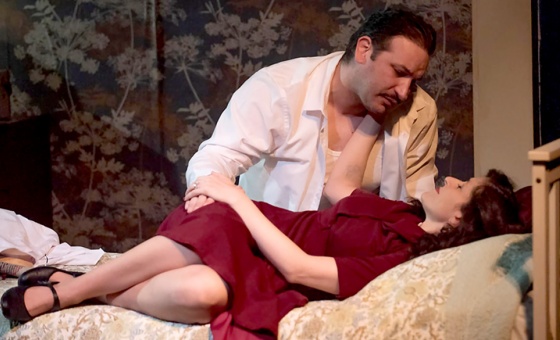This is the last article you can read this month
You can read more article this month
You can read more articles this month
Sorry your limit is up for this month
Reset on:
Please help support the Morning Star by subscribing here
ONE hundred years ago, as the last days of 1918 became the early days of 1919, the newly founded German Communist Party (KPD), with 50,000 members, held a crucial congress.
Inspired by the success of Lenin and his 1917 Bolshevik Revolution, they voted to oppose both the councils and the Constituent Assembly that were ruling a defeated, demoralised and almost destroyed country and organise an armed uprising to take power and establish a truly socialist Germany.
Communist Party founder and Spartacus League leader and theoretician Rosa Luxemburg was far from convinced that such a move could be successful, but she decided reluctantly to join the fight. This German revolution, with inadequate forces, fizzled out rather as Luxemburg had so sadly predicted.
She stayed in the capital, and on January 16 she was seized, along with her chief ally Karl Liebknecht. In 1914 he had been the only member of the Reichstag to vote against German involvement in the war.
The pair were arrested by members of the Freikorps — a private army led by extreme right-wing proto-fascist officers in charge of ex-soldiers who had defied the Treaty of Versailles and held on to their weapons after the war.
Also in the Freikorps were mercenaries, adventurers, fanatical nationalists, even unemployed youths. This ragged band would make up the richly manured soil in which Hitler and his nazis would put down roots to grow and blossom in the next 20 years.
The Freikorps blamed Social Democrats and Jews for Germany’s plight and called for the elimination of what they saw as traitors to the Fatherland.
They took Liebknecht to the Tiergarten park in the west of the city, where he was murdered with a bullet in the head.
Luxemburg, meanwhile, was held and tortured in the Eden Berlin Hotel which was being used as army headquarters.
She was led out of the building where two blows from a rifle butt smashed her skull. Her almost lifeless body was flung into a car where a further blow and a bullet in the head finished her off.
Her beaten and bloody body was dumped in the Landwehr Canal in Kreuzberg, not to be found until months later.
Luxemburg may have been dead but her ideas and her beliefs could not be extinguished as easily as her frail body.
When he heard of her death, Lenin, with whom Luxemburg had many discussions, arguments and disagreements, said: “Rosa Luxemburg was and remains for us an eagle and not only will communists all over the world cherish her memory, but her biography and her complete works will serve as useful manuals for training many generations of communists all over the world.”
So just who was Rosa Luxemburg? She was born in 1871 to a Jewish family in Zamosc in Russian-occupied Poland. A sick child, she was wrongly treated for tuberculosis of the bone causing her to walk with a limp all her life.
Luxemburg could read and write by the age of five. At school in Warsaw, there was a rigid quota for Jews. Speaking Polish was forbidden. Luxemburg soon developed socialist views and supported Polish independence. She joined the Polish Proletariat Party at the age of 15.
Women could not attend Russian universities, so in 1889 she moved to Zurich to become one of the first female doctors of philosophy, law and political economy.
Luxemburg always considered herself a citizen of the world. Writing from prison in 1917 about being a Jew from the ghettos she declared: “...I feel as close to the wretched victims of the rubber plantations in Putumayo and the blacks of Africa with whose bodies the Europeans play ball.”
In order to acquire German citizenship she married Gustav Lubeck, the son of a friend. The couple never lived together and divorced five years later.
In 1890 she met Leo Jogiches, who had already been to prison for revolutionary activity. They would become lifelong friends, comrades and lovers.
In Berlin Luxemburg joined the German Social Democratic Party. By now she was a committed revolutionary. She trained herself to become an impressive public speaker despite her small stature.
With Karl Kautsky she argued against the revisionists like Eduard Bernstein who preached that the best way to obtain socialism in an industrialised country was through trade union activity and parliamentary politics.
Her argument was in a pamphlet, Reform or Revolution. In it she declared she was a committed Marxist. How true that was. Indeed much later leading German communist Franz Mehring would describe her as the “most brilliant head that has yet appeared among the scientific heirs of Marx and Engels.”
By 1903 she was helping to form the illegal Social Democratic Party of Poland, editing the party’s newspaper from exile in Paris.
In 1904 she published Organisational Questions of the Russian Democracy, where she criticised some of Lenin’s views.
She opposed his views on centralism, suggesting that any successful revolution that used this strategy would develop into a communist dictatorship.
During the 1905 Revolution in Russia, Luxemburg and Jogiches returned to Warsaw where all too soon they were arrested.
Luxemburg’s experiences during the failed 1905 revolution changed her views. Luxemburg had previously believed that a socialist revolution was most likely in an advanced industrialised country such as Germany or France. Now, she argued, it could happen in an underdeveloped country like Russia.
At the Social Democratic Party Congress in September 1905, Luxemburg called for party members to be inspired by the attempted revolution in Russia.
She began teaching at the Social Democratic Party school in Berlin. It was here she first met Liebknecht who had been almost a lone voice against the war and the only member of the Reichstag to vote against Germany’s participation.
Liebknecht led the campaign against building dreadnoughts — the massive warships that major industrial nations like Britain and Germany raced to build to dominate the seas.
Luxemburg and her close friend Clara Zetkin were horrified that the SDP, the largest socialist party in the world with over a million members, supported the war and the build-up of the German armed forces.
When the pair tried to take action against the war only Liebknecht and one other SDP member supported them.
Luxemburg sent 300 telegrams to SPD officials whom she judged anti-war. Sadly the responses were pitiful.
Still they battled on. In September 1914 Luxemburg and Zetkin bravely signed letters to socialist newspapers in neutral countries condemning the war.
Liebknecht too continued to speak out for peace: “The war is not being waged for the benefit of the German or any other peoples. It is an imperialist war, a war over the capitalist domination of the world market,” he declared.
In December 1915, he persuaded 19 deputies to vote with him against war credits. Outside parliament the many anti-war demonstrations often ended with bitter clashes between workers and police. Luxemburg’s anti-war campaigning saw her arrested yet again.
Political prisoners had won the right to have books and writing materials in prison and Luxemburg was soon at work smuggling articles to Franz Mehring for a new journal, Die Internationale.
In the first edition Luxemburg told how the SDP had reacted to the outbreak of the war. “Social Democracy,” she said “backed down without a struggle and conceded victory to imperialism.”
Luxemburg was freed in February 1916, and immediately she and Liebknecht founded the underground revolutionary Spartacus League as a breakaway from Germany’s SDP.
The Spartacus League published an illegal newspaper and, like the Bolsheviks in Russia, they used it to argue that socialists should turn this nationalist conflict into a revolutionary war.
On May 1 1916 Rosa led the organisation of a huge anti-war demonstration on Potsdamer Platz in Berlin but just as Liebknecht was about to speak to the large crowd, armed police charged and Liebknecht was snatched.
Liebknecht was supposed to have parliamentary immunity from prosecution. The authorities demanded that this immunity be removed.
The Reichstag agreed and he was placed on trial and sentenced to two years and six months hard labour.
The day Liebknecht was sentenced, 55,000 munitions workers went on strike. The government responded by arresting trade union leaders and conscripting them into the German army.
In Russia in 1917 the Bolshevik Revolution inspired workers all over the world, not least in Germany. Luxemburg’s enthusiastic support for the Russian Revolution didn’t stop her criticising the Bolsheviks for disbanding the Constituent Assembly and suppressing rival parties.
“Freedom only for the supporters of the government, only for the members of one party — however numerous they may be — is no freedom at all,” she argued.
Back in Germany Luxemburg and her comrades kept up their anti-war protests as Germany was slowly losing the war. Germany conceded defeat in November 1918.
It would be only a few weeks before the defeated generals and politicians would take pathetic revenge on the woman who had been such a thorn in their sides and had so nearly led the German working class to a socialist revolution.
Those generals and politicians are all but forgotten today but even after 100 years the memory of Red Rosa still soars like an eagle to inspire revolutionary socialists all over the world.











